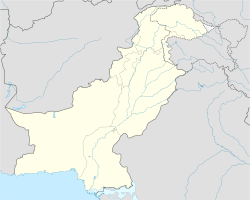Gah, Pakistan
| Gah گاہ |
|
|---|---|
| Coordinates: Lua error in package.lua at line 80: module 'strict' not found. | |
| Country | |
| Province | Punjab |
| Time zone | PST (UTC+5) |
Gah is a village of Chakwal District (formerly in Jhelum District when Chakwal had been a Tehsil of Jhelum District) in the Punjab province of Pakistan. It is located in the Union council of Begal (also known as Bigal) at 33°3'45N 72°39'8E,[1] the Naib Nazim or vice president of Begal is from Gah.[2] It is known widely for being the birthplace of former Indian Prime Minister Manmohan Singh on 26 September 1932.
Birthplace of Former Indian Prime minister Manmohan Singh
Gah is the birthplace of former Indian Prime minister Manmohan Singh.[3] Due to the violence that accompanied the Partition of India in 1947 Hindus and Sikhs had to leave the area for India.
- Development as a Model Village
In 2004, after Singh had become Prime Minister, the Punjab provincial Government declared it would develop Gah as a model village in his honour.[4]
- Manmohan Singh Government Boys Primary School
A local boys school was renamed as "Manmohan Singh Government Boys Primary School" in his honour.[5]
- Solar Power Plant
In October 2012, TERI—a research institute from India set up a mini grid of solar power as a mark of goodwill to the birthplace of the Former Indian Prime Minister. The mini grid supplied power to 51 families in the village and water heaters of three mosques.[6]
Etymology
Gah or Gai is believed to have derived from ‘Gohar’ a former chieftain of the village. Gohar later became “Garaha” and subsequently shortened to “Gah”.[2]
References
- ↑ Location of Gah - Falling Rain Genomics
- ↑ 2.0 2.1 A day in Manmohan Singh’s village - The Tribune India
- ↑ Tracing Indian PM's Punjabi roots - BBC News 26 May, 2004
- ↑ Schoolmate wants to meet PM - The Hindu
- ↑ Chaudhry Shujaat Hussain Becomes Prime Minister - The story of Pakistan
- ↑ http://www.indianexpress.com/news/teri-brings-solar-power-to-manmohan-s-village-in-pak/1013084/
Lua error in package.lua at line 80: module 'strict' not found.
